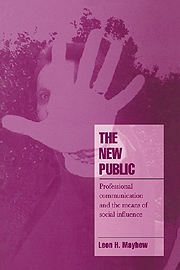Book contents
- Frontmatter
- Contents
- Preface
- Part I Rhetoric and the integration of society
- Part II Influence
- 3 Influence: capacity to persuade
- 4 Habermas and Parsons: critical issues regarding influence
- 5 Public influence: a new paradigm
- 6 The differentiation of rhetorical solidarity
- Part III The New Public
- Notes
- References
- Index
5 - Public influence: a new paradigm
Published online by Cambridge University Press: 06 September 2009
- Frontmatter
- Contents
- Preface
- Part I Rhetoric and the integration of society
- Part II Influence
- 3 Influence: capacity to persuade
- 4 Habermas and Parsons: critical issues regarding influence
- 5 Public influence: a new paradigm
- 6 The differentiation of rhetorical solidarity
- Part III The New Public
- Notes
- References
- Index
Summary
Habermas would describe the New Public as further “technicizing” of the means of domination. A new class of professional experts in the modes of mass rhetoric is seeking more sure control over what passes for public opinion. For Habermas, to speak of a public is to assert that there is a sphere of society in which discourse is free from domination by the state or any other organized system of power. To constitute a public sphere, such discourse must be open, accountable, and governed by good reasons. A loose, common sense notion of the “public” will not do. A true public sphere provides (and creates) differentiated social space for public life. Always fragile at best, the public sphere, has steadily eroded as the content of public discourse changed from debate about justifiable standards of integration to the manufacture of consent. The organs of power in society have learned to construct and present displays of their own legitimacy that support mere assent to their regime.
The division of sectors of society into either “spheres” or “systems” depends on where meaningful boundaries can be drawn. Are there boundaries defining the independence of the integrative system from the political system, establishing its differentiation? We must also ask whether integrative communication backed by prestige allows for voluntary compliance in the strict sense, and thus meets the criteria for persuasive communication, or whether it is fraudulent and therefore coercive. We again face the fundamental question of the nature of rhetoric and its place in social theory, a question that becomes all the more important with the rise of the rhetorical techniques purveyed by the new specialists in public communication.
- Type
- Chapter
- Information
- The New PublicProfessional Communication and the Means of Social Influence, pp. 118 - 154Publisher: Cambridge University PressPrint publication year: 1997

